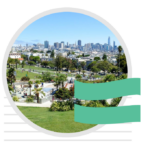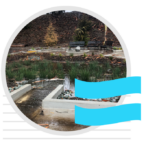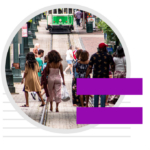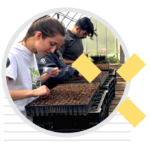January 17, 2022
Topic
CalBike developed our Quick-Build Guide in partnership with Alta Planning + Design. You can download it from our website or request a hard copy mailed to you (or your favorite city planner) for free.
The steep rise in biking and walking during the pandemic added urgency to a long-standing problem—long lead times and high costs make it challenging to build the infrastructure we need now. CalBike, California’s statewide bicycle coalition, advanced a solution: a guide to quick-build design principles.
Complete Streets projects, which create comfortable, safe spaces for people to use all modes of transportation, often take a decade or more to plan and build. And lack of funding to pay for curb and roadway changes can push implementation even further. Quick-build design uses inexpensive materials, such as paint and plastic bollards, to make streets safer in months, not years. The faster rollout is a terrific way to make an intersection safer after a collision and before anyone else is hurt, and the low-cost materials put quick-build within reach of municipal budgets.
Quick-build also has an advantage in community involvement. The quick-build process relies on a shorter community input process before implementing the changes. Then, once the paint and planter boxes are in place, cities can adjust the design based on public feedback on the installed project. In the traditional review process, stakeholders form opinions based on hard-to-read 2D drawings and planning documents. That can often lead to negative feedback from neighbors fearful of change that’s hard to understand. In the quick-build process, community members have the opportunity to respond after experiencing the changes to their streets, and that leads to more helpful feedback and stronger community support.
In 2021, communities showed that they could respond quickly when the circumstances demand it. Many cities designated Slow Streets to create more space to play and roll safely. Even after the pandemic, quick-build design will help planners develop fast responses to community needs and CalBike’s Quick-Build Guide puts those design tools into the hands of local planners across California.
At CalBike, we believe that current conditions necessitate fast action to build safer streets. Traffic fatalities have risen across the U.S. since the beginning of the pandemic, including in California. People who walk and bike need the protection of better infrastructure now. Quick-build can save lives.
Also, our state and our planet can’t wait decades to build communities where active transportation is an easy choice. The last few years have shown the severity of the threat that climate change poses to California. Quickly transforming our communities to make it safer and more convenient to get around by bike, on transit, or on foot is a climate action that’s within our reach with quick-build. And we’ll get the advantage of more livable and less polluted neighborhoods, as well.
Some quick-build projects are eventually replaced with hardscape, while others function well for years with paint and bollards. In either case, Californians benefit from improved infrastructure in weeks or months, not years or decades.
In 2022, CalBike hopes to secure grant funding for a California city that will plan and complete an entire bike network in just three years. We believe that this could be a model to help other communities begin the transition to greener transportation options, and quick-build is one of the tools that can make this happen.
CalBike developed our Quick-Build Guide in partnership with Alta Planning + Design. You can download it from our website or request a hard copy mailed to you (or your favorite city planner) for free.
CalBike advocates for equitable, inclusive, and prosperous communities where bicycling helps to enable all Californians to lead healthy and joyful lives. We work with agencies and elected officials to develop policies and pass laws that encourage and support active transportation.




